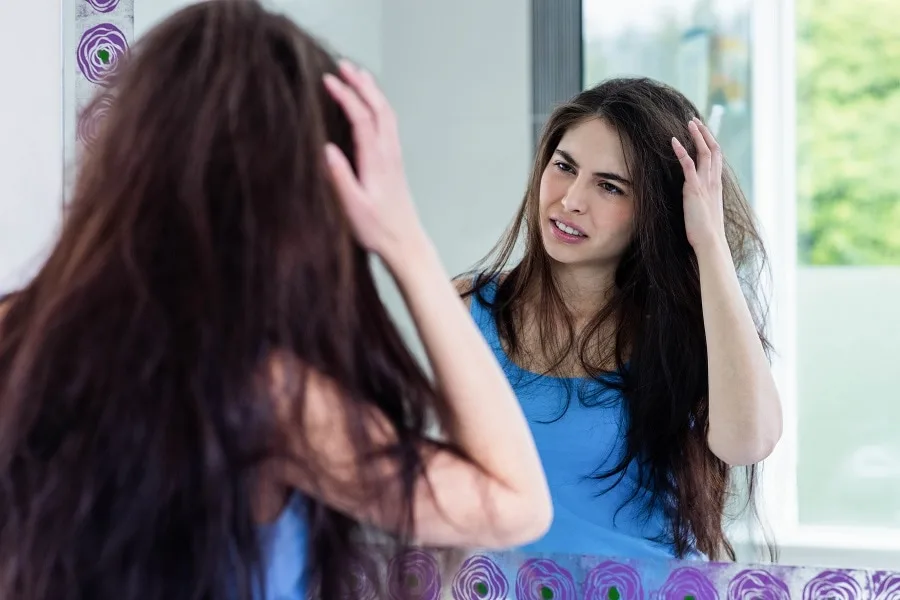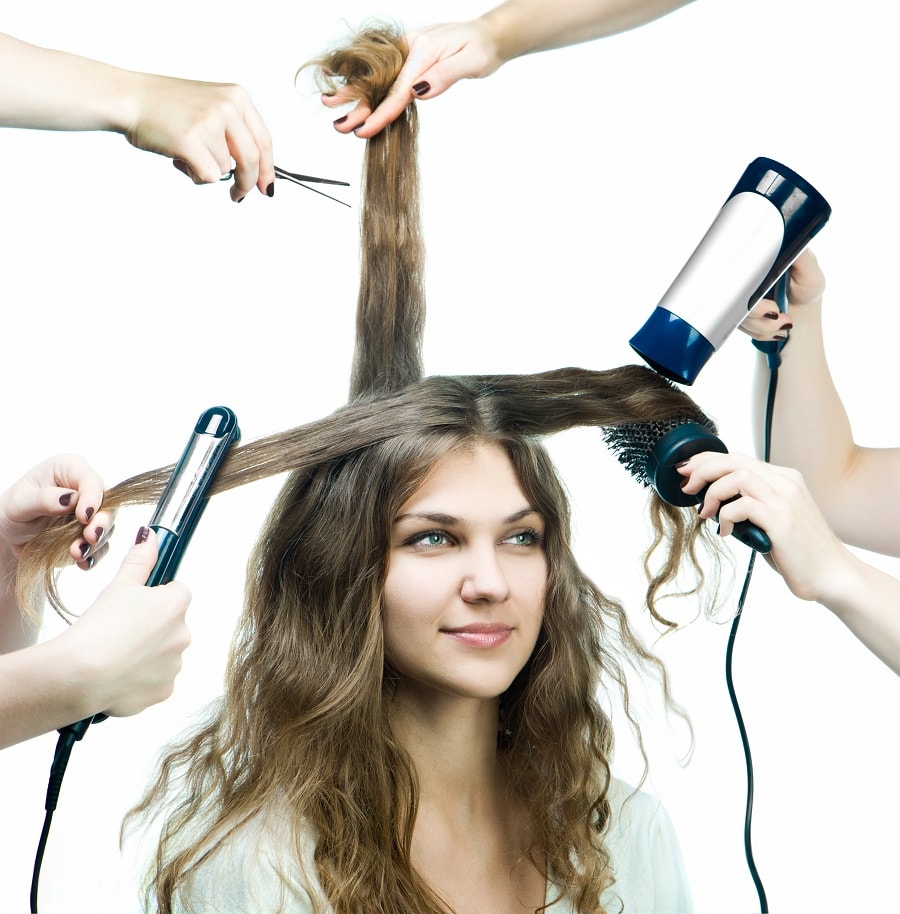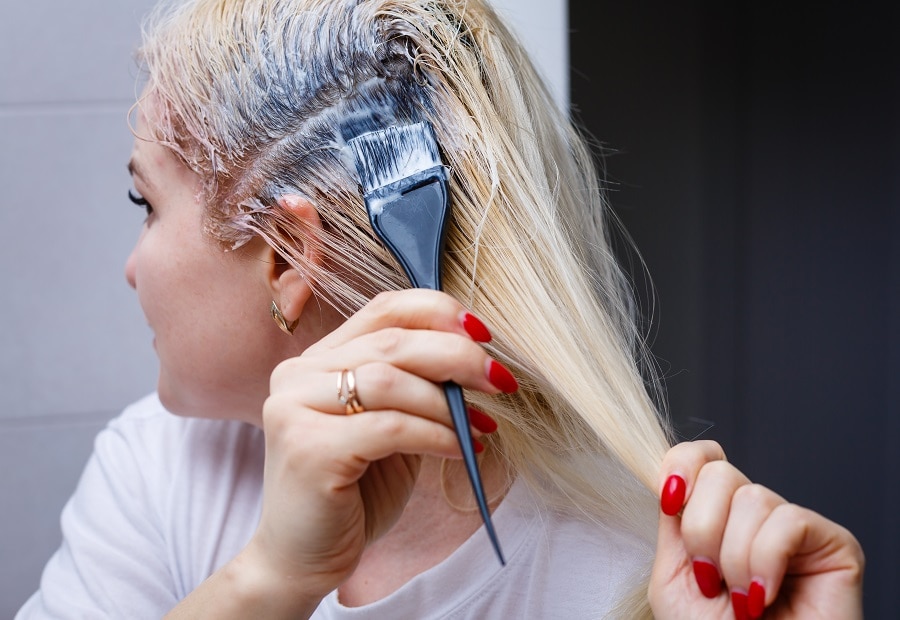
Why does my hair swell when it dries? – HairstyleCamp
If you have unruly hair that doesn’t seem to behave itself, you’ll likely find yourself asking the following question time and time again:Why does my hair swell when it dries?“
You comb, brush and spray with water, yet 10 minutes later it always swells up again. If this problem annoys you to no end, know that you are not alone. Countless people struggle with “poppy” hair every day and are at a loss as to what they can do.
Fortunately, once you are able to determine the cause of the swelling, you can take measures against it. In this guide, we’ll break down the different reasons why hair turns poppy when it dries and tell you how you can prevent it so you can finally say goodbye to that messy, frizzy head of bed.
Why is my hair puffy when it dries?
Hair swells as it dries due to the absorption of moisture from the air, which causes hair strands to swell and frizz. This phenomenon is more common in curly or wavy hair, because the hair cuticle is more susceptible to opening and allowing moisture in, leading to a puffy appearance.
Here are 8 reasons why your hair becomes puffy when it dries. If you constantly find yourself with puffy hair after blow-drying, it’s most likely due to one of the following reasons:
humidity

So let’s start with the number one most common cause of puffy hair: humidity.
Hair is composed of a protein called keratin, which is structured in tubular strand-like follicles. These protein fibers are held together by two types of bonds: disulfide bonds and hydrogen bonds. In this case, we are looking at hydrogen bonds, which break when exposed to water.
Say you’re taking a shower. The water temporarily breaks the hydrogen bonds in your hair, causing it to become flexible. When it dries, it takes on a new shape. Humidity, which is the moisture in the air, can break these bonds as well and actually causes your hair to come clean as it absorbs that moisture while drying.
This is why the iron in the hair is more noticeable in the coastal and humid areas.
Washing in hot water
If you shower with scalding hot water and suffer from frizzy hair, it’s probably time to lower the temperature. This is because hot water dries out your hair follicles and causes them to absorb excess moisture while drying.
It’s similar to how humidity works, except you have a little more control over this factor.
Excess heat exposure from styling

Previously we mentioned that keratin is held together by disulfide and hydrogen bonds. Sources indicate that disulfide bonds can only be broken through extreme heat, such as drying hair or using a flat iron.
In addition to irreversibly damaging your hair follicles, heat can also dry out your hair and make it more vulnerable to humidity.
Wash your hair too much
Even if you always wash your hair with lukewarm water, cleaning it too much can be just as harmful. This study highlights the negative effects of using shampoo too often, noting that it washes away your hair’s natural oils and causes them to become damaged.
The conclusion of the study is that shampooing your hair 5-6 times a week cleans your hair adequately and shows no sign of harmful effects.
Overuse of products
It’s not just shampoo that damages and dries out your hair; Many general hair products cause problems over time with excessive use.
If you use a lot of harsh hair care products, it’s probably time to lighten up. You don’t have to ditch your routine completely, but less is usually more.
genetics
While genetics doesn’t play a direct role in your hair’s tendency to become frizzy and frizzy, curly hair tends to suffer from these problems much worse than other hair types. This is especially true for curly hair that has been straightened using a flat iron.
Dyeing/chemically treating your hair

Dyeing, perming or chemically treating your hair may look stylish, but it’s quite damaging to the well-being of your follicles.
Many of the chemicals used in hair care and styling break disulfide bonds, which are normally only broken by heat. As we discussed before, these connections are necessary to maintain the shape of the hair and its health.
You don’t have to give up coloring your hair, but if you choose to do so, you need to take extra good care of your scalp.
Damaged/dry hair
Damaged and dry hair, in general, causes pubic hair. It doesn’t necessarily have to be caused by one of the problems mentioned in this list, but it’s essential to always take care of your hair and treat it to the best of your ability.
How can I prevent my hair from getting puffy when it dries?
Here are some tips that will prevent your hair from puffing up when it dries:
- Wash smart: use small amounts of shampoo and condition your hair often. Lower the temperature to lukewarm temperatures, and consider using a shower cap every now and then.
- Hair tone treatments: Whether it’s flat ironing or coloring, give your hair a break. Try to use less styling products and more natural treatments, such as essential oils.
- Frizz protector: Sometimes in the most humid environments, there’s no stopping puffy hair. In this case, you might want to try some frizz protectors to prevent excess moisture in your follicles.
- Use microfiber towels: Regular towels can have coarse bristles and make your hair frizzy. Instead, try a microfiber towel, which is a much gentler alternative.
- Rinse with cold water after sweating: If you’ve been sweating profusely while exercising, chances are the salty moisture has made its way to your scalp. Although it is harmless, it can dry out your hair, and it is best to wash with cold water as soon as possible.
Hopefully, with this guide, you’ll have everything you need to solve your frizzy, puffy hair and finally eliminate that pesky belly button on the top of your head.